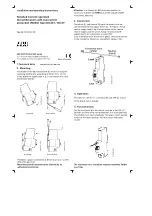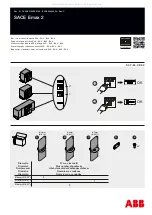
CHAPTER 3: INSTALLATION
WIRING
B30 BUS DIFFERENTIAL SYSTEM – INSTRUCTION MANUAL
3-15
3
3.3.2 Dielectric strength
Dielectric strength is the maximum electric strength that can be sustained without breakdown. It is measured in volts.
The table shows the dielectric strength of the UR-series module hardware.
Table 3-1: Dielectric strength of UR series modules
3.3.3 Control power
The power supply module can be ordered for two possible voltage ranges, and the B30 can be ordered with or without a
redundant power supply module option. Each range has a dedicated input connection for proper operation. The ranges
are as follows (see the Specifications section of chapter 2 for details):
•
Low (LO) range — 24 to 48 V (DC only) nominal
•
High (HI) range — 125 to 250 V nominal
The power supply module provides power to the relay and supplies power for dry contact input connections.
The power supply module provides 48 V DC power for dry contact input connections and a critical failure relay (see the
Typical Wiring Diagram earlier). The critical failure relay is a form-C device that is energized once control power is applied
and the relay has successfully booted up with no critical self-test failures. If ongoing self-test diagnostic checks detect a
critical failure (see the Self-Test Errors section in chapter 7) or control power is lost, the relay de-energizes.
To connect power to the relay, 14 gauge stranded wire with disconnect devices is recommended. Connect all wires to the
relay before turning on power.
Module type Module function
Terminals
Dielectric strength
From
To
1
Power supply
High (+); Low (+); (–)
Chassis
2000 V AC for 1 minute
1
Power supply
48 V DC (+) and (–)
Chassis
2000 V AC for 1 minute
1
Power supply
Relay terminals
Chassis
2000 V AC for 1 minute
2
Reserved
N/A
N/A
N/A
3
Reserved
N/A
N/A
N/A
4
Digital contact inputs/
outputs
All
Chassis
2000 V AC for 1 minute
5
Analog inputs/outputs
All except 8b
Chassis
< 50 V DC
6
Digital contact inputs/
outputs
All
Chassis
2000 V AC for 1 minute
7
G.703
All except 2b, 3a, 7b, 8a
Chassis
2000 V AC for 1 minute
RS422
All except 6a, 7b, 8a
Chassis
< 50 V DC
8
CT/VT
All
Chassis
2000 V AC for 1 minute
9
CPU
All
Chassis
2000 V AC for 1 minute
Filter networks and transient protection clamps are used in the hardware to prevent damage caused
by high peak voltage transients, radio frequency interference (RFI), and electromagnetic interference
(EMI). These protective components can be damaged by application of the ANSI/IEEE C37.90
specified test voltage for longer than the specified minute.
Power supplied to the relay must be connected to the matching power supply range of the relay. If
incorrect voltage is applied or voltage is applied to the wrong terminals, damage can occur.
The B30, like almost all electronic relays, contains electrolytic capacitors. These capacitors are well-
known to deteriorate over time if voltage is not applied periodically. Deterioration can be avoided by
powering up the relay at least once a year.
Summary of Contents for b30
Page 10: ...x B30 BUS DIFFERENTIAL SYSTEM INSTRUCTION MANUAL TABLE OF CONTENTS ...
Page 486: ...5 278 B30 BUS DIFFERENTIAL SYSTEM INSTRUCTION MANUAL TESTING CHAPTER 5 SETTINGS 5 ...
Page 616: ...iv B30 BUS DIFFERENTIAL SYSTEM INSTRUCTION MANUAL ABBREVIATIONS ...
Page 632: ...xvi B30 BUS DIFFERENTIAL SYSTEM INSTRUCTION MANUAL INDEX ...













































